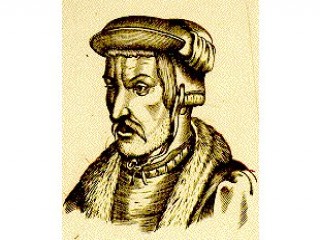
Cornelius Agrippa biography
Date of birth : 1486-09-14
Date of death : 1535-02-18
Birthplace : Cologne, Germany
Nationality : German
Category : Historian personalities
Last modified : 2011-08-09
Credited as : Magician, occult writer, alchemist
0 votes so far
Cornelius Agrippa was a medieval German alchemist, astrologer, occultist and scientific writer who contributed to the rise of skepticism in his era. His best known work, Three Books of Occult Philosophy, was considered a virtual encyclopedia of magic and the occult arts, but paradoxically, his The Vanity and Uncertainty of the Arts and Sciences offered a thoughtful critique of human knowledge in numerous realms, including astrology and mysticism. He practiced as both a lawyer and physician, and his students included Johannes Wier. He was an early feminist, noted for his protestations against the subjection of women and witch-hunting frenzies in a time when such arguments were literally considered heresy. His writings were widely read, translated into numerous languages, and referenced long after his death.
Agrippa's wrote on a great many topics, including marriage and military engineering, but his most important work is the three-volume De occulta philosophiae (written c. 1510, published 1531), a defense of "hidden philosophy" or magic, which draws on diverse mystical traditions -- alchemy, astrology, Kabbalah. A later work, De incertitudine et vanitate scientiarum (Of the Uncertainty and Vanity of the Sciences), attacks contemporary scientific theory and practice.
Many of his opinions were controversial. His early lectures on theology angered the Church, and his defense of a woman accused of witchcraft in 1520 led to his being hounded out of Cologne Cologne by the Inquisition. In his own day, Agrippa was widely attacked as a charlatan. After his death, legends about him were plentiful. Some believed him to be not only an alchemist but a demonic magician, even a vampire. In one account, he traveled to the New World.
In 1799, Robert Southey published an amusing ballad on this man, suggestive of his later reputation as a master of black magic, as well as of his susceptibility to gothic trappings. Percy Bysshe Shelley listed Agrippa and Paracelsus among his favorite writers in a discussion with Godwin in 1812.
















